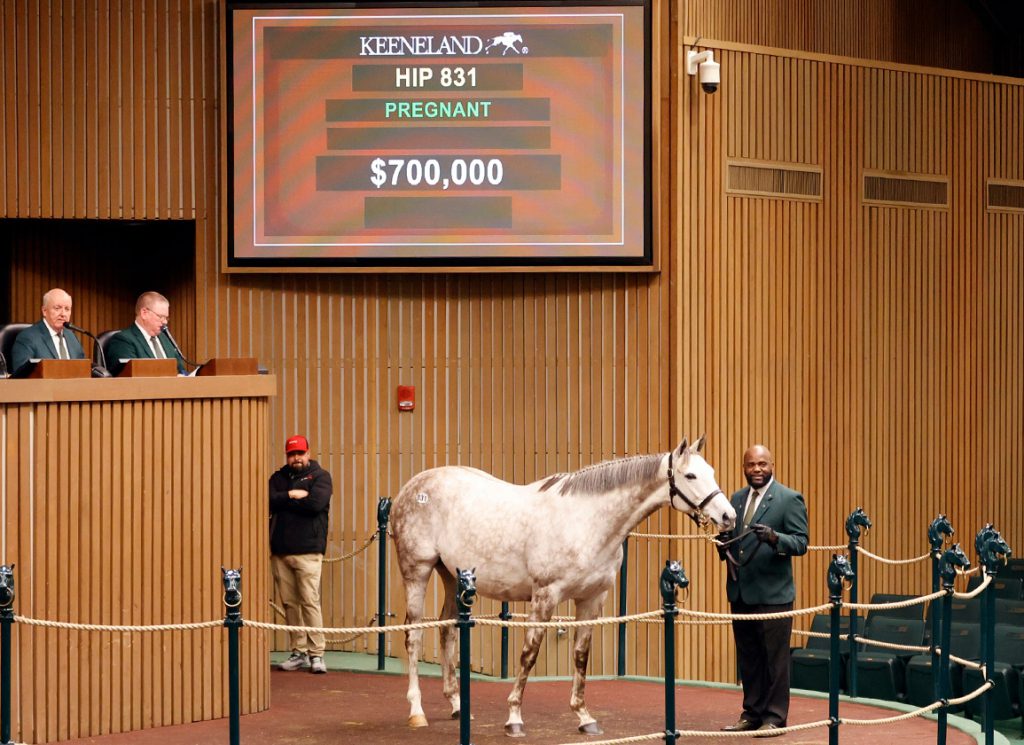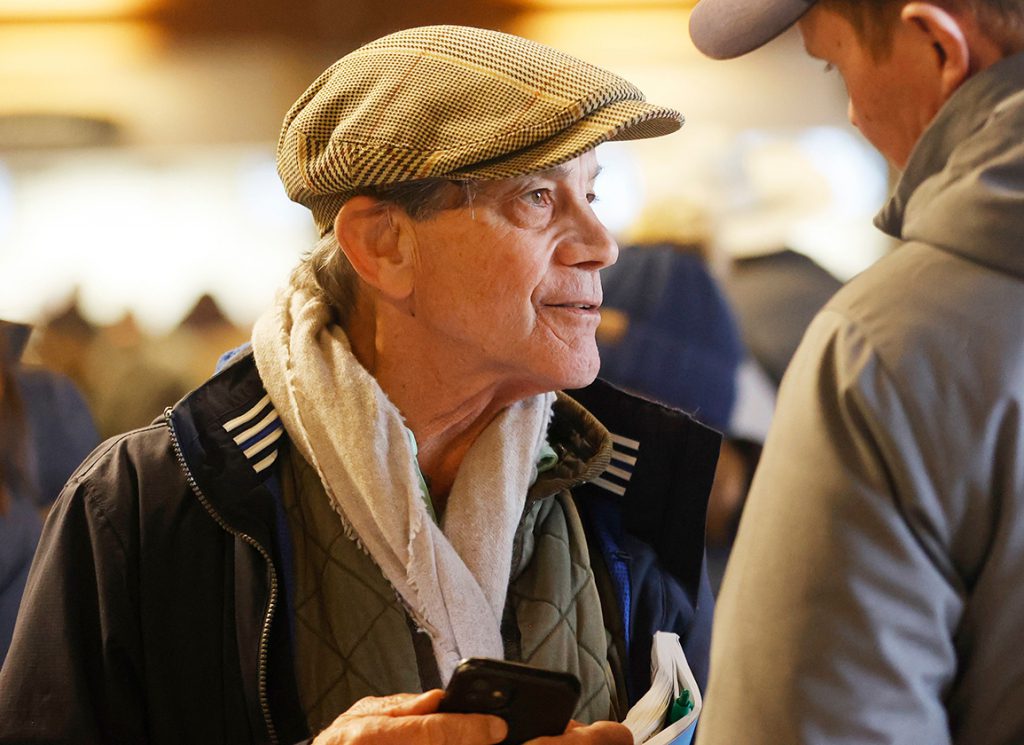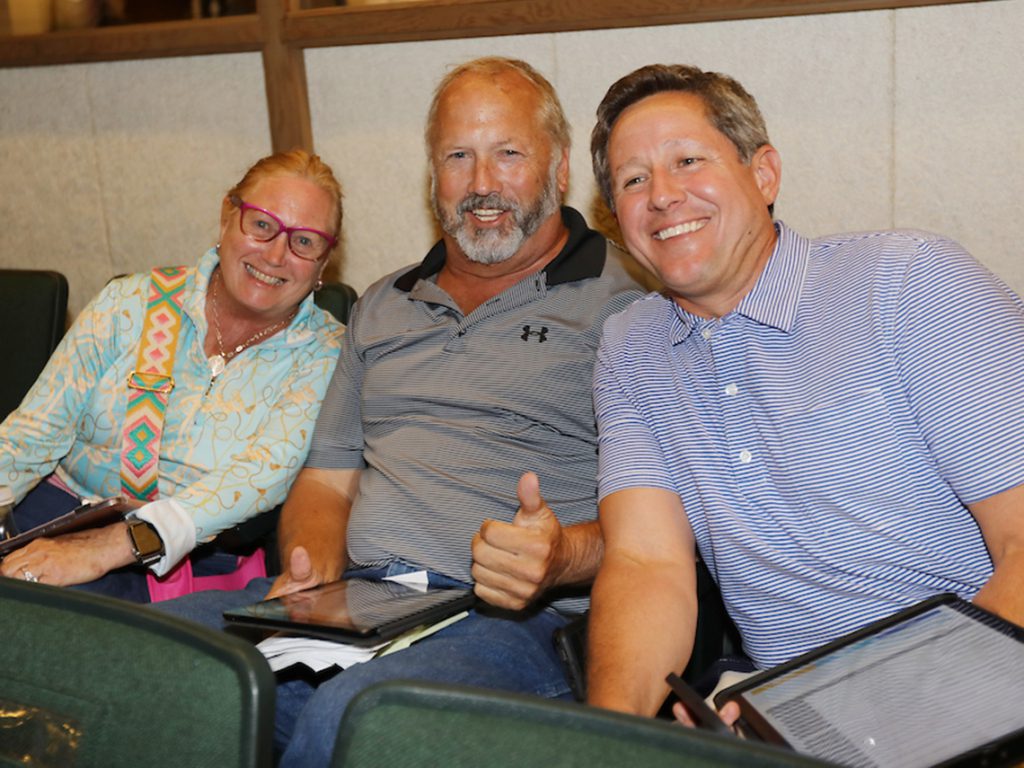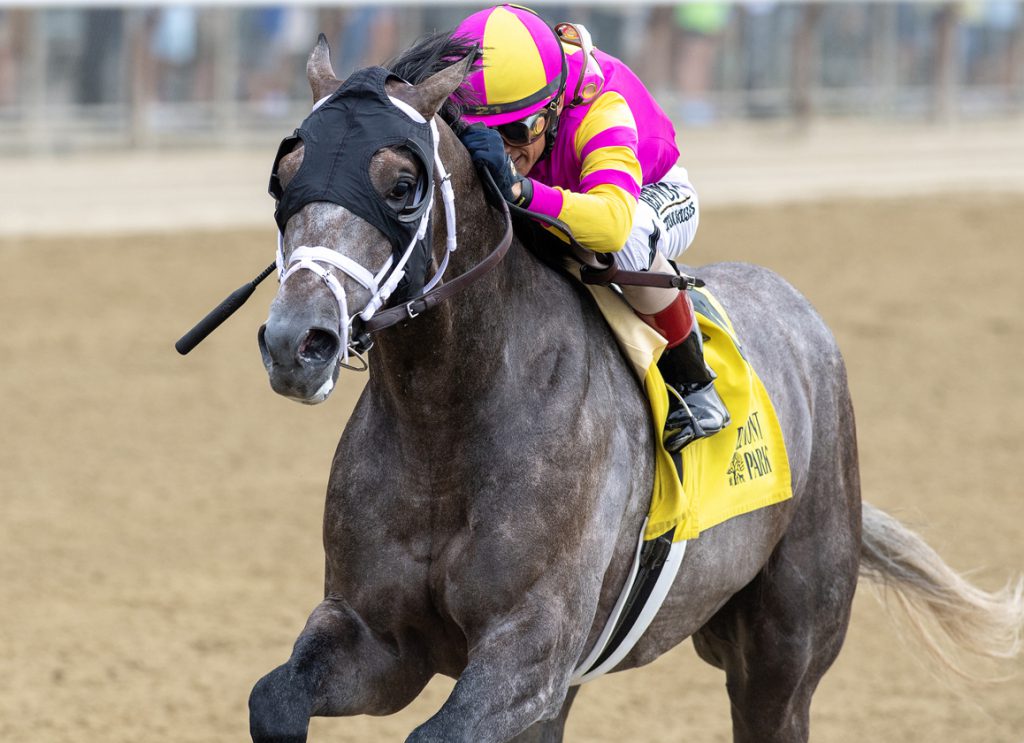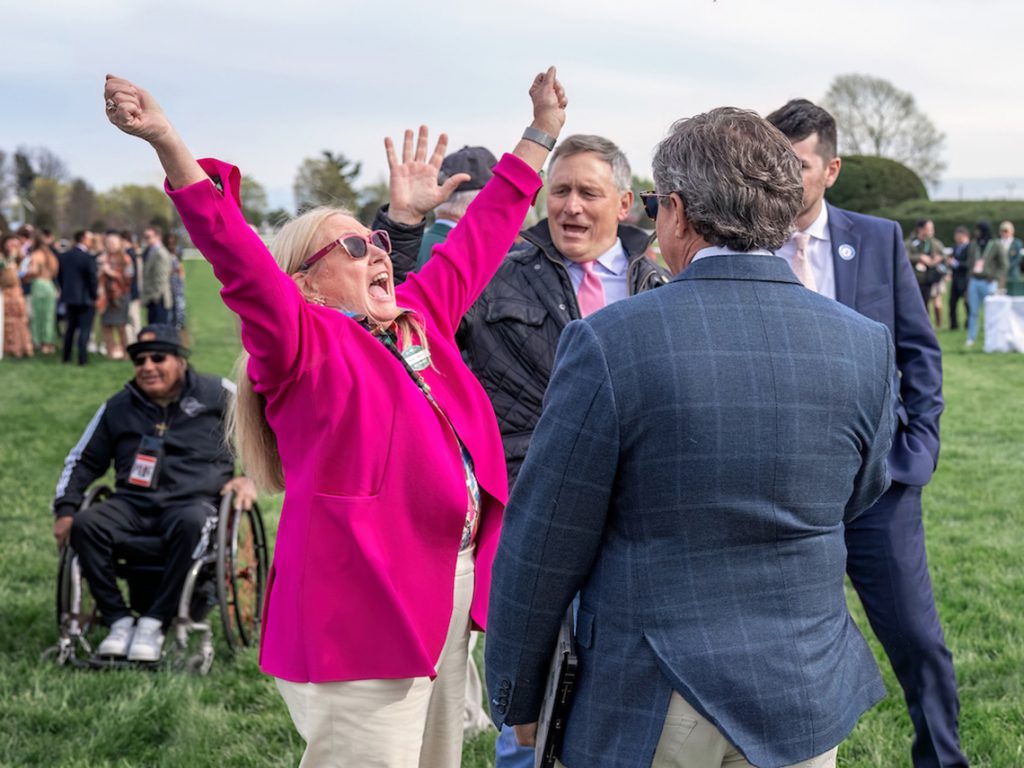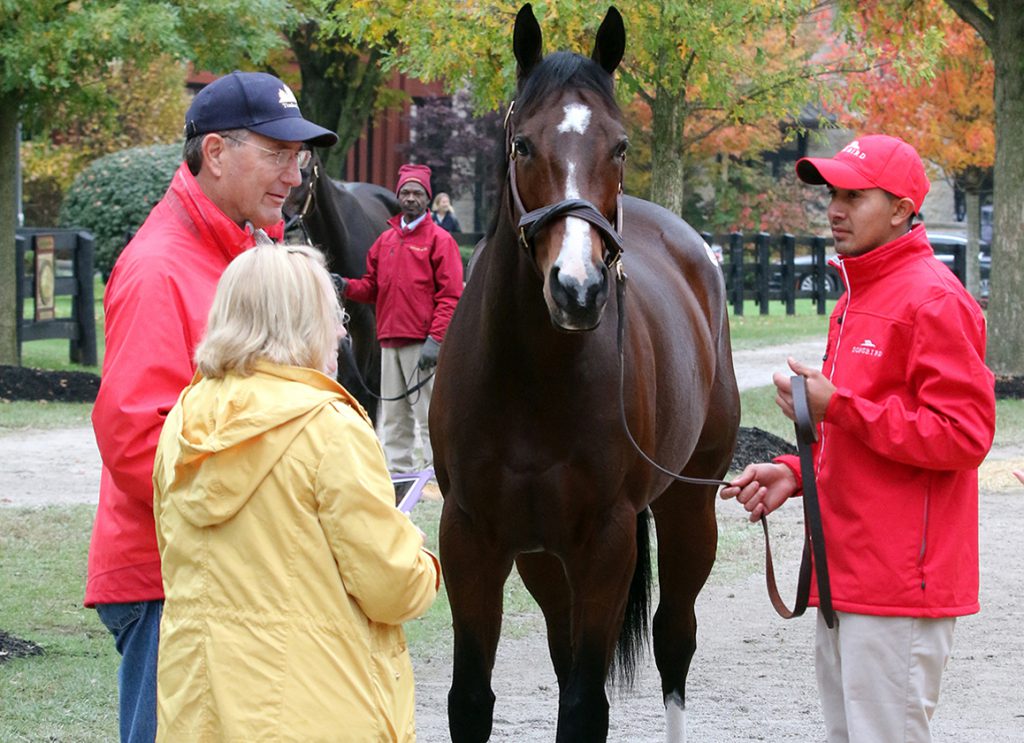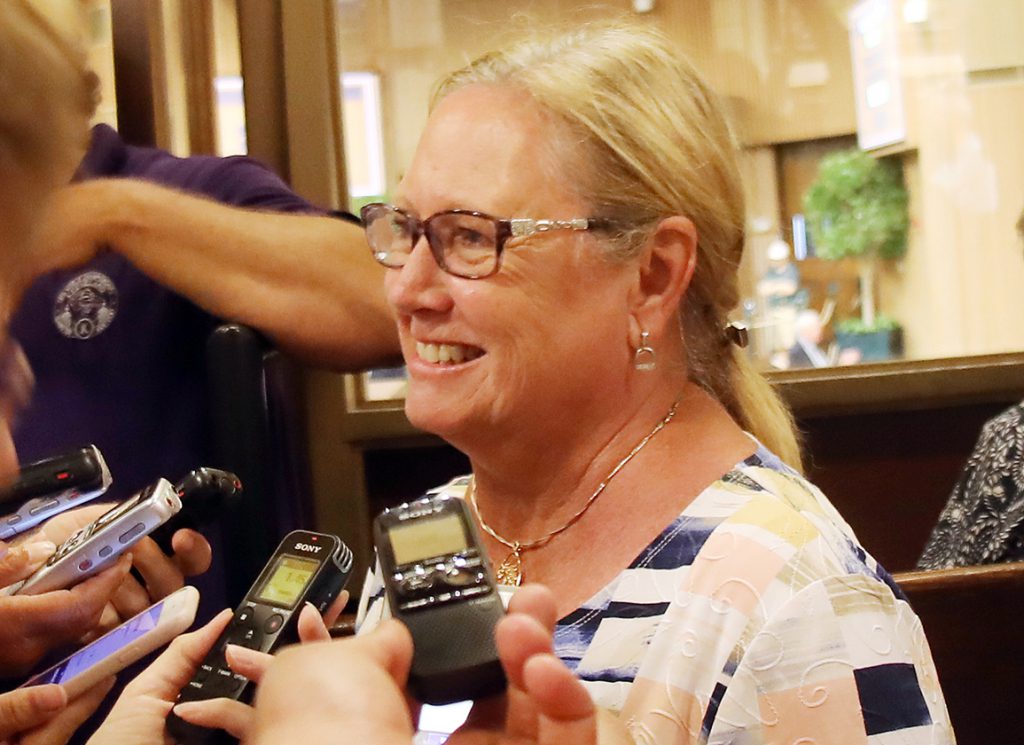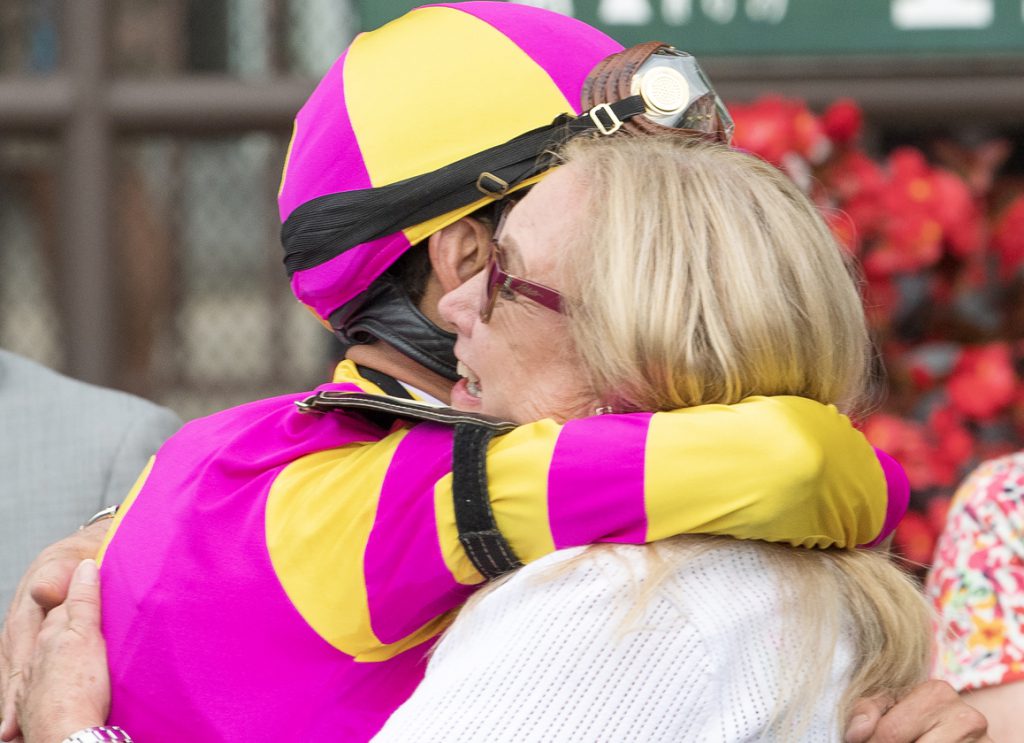by Jessica Martini & Stefanie Grimm
LEXINGTON, KY – During a session dominated for much of the day by the short yearlings, the supplemented broodmare Sebago Lake (Tapit) jumped to the lead in the final hips when selling for $700,000 to Mandy Pope's Whisper Hill Farm. Overall, through two days of the four-day auction, 430 head have grossed $31,596,700 for an average of $73,481 and a median of $30,500. With continued strength at the top of the market, the Book 1 average dipped just 3.39% from a year ago, but the median is down 23.75%.
“It started off very healthy,” Keeneland's Vice President of Sales Tony Lacy said of Tuesday's session. “Through the day, there were some spots where it got a little slower, but it ended up really strong. Again, quality was to the fore. You saw some of those young mares, bred to some exciting new stallions were selling extremely well. Farms are reloading again. We saw the same pattern that we saw yesterday.”
The two-day buy-back rate is 27.97%. It was 26.92% a year ago.
Three short yearlings sold for $400,000 or over during Tuesday's session, with a colt by Not This Time and a filly by Candy Ride (Arg) sharing the day's top price of $430,000.
“Foals that were by the right stallions, had the right physicals, vetted, there was a very strong, competitive environment for them,” Lacy said. “There is a lot of confidence out there. Speaking to the sellers, they felt like it was a really good market. The buyers found it to be very competitive to try to buy the stock they were interested in. I don't think it's inflated at all, I don't think it's depressed in any way. I think it feels like a very healthy, fair environment. If you bring the right stock to market, you are going to get rewarded for it. Today was just a continuation of the momentum we saw yesterday.”
With 424 head catalogued for Tuesday's session, only 275 went through the ring.
“It's sort of a factor of the time of year we are in,” Keeneland's Director of Sales Operations Cormac Breathnach said of the large number of outs. “It's a time of year when weanlings-into-yearlings are changing a lot. They don't always vet the way people intend them to vet and they are happy to wait until September in some cases. We did have more outs than we were expecting. They kind of came in early, though, so going into yesterday, we already had a lot of outs, and more than we would have had last year, and we had a couple dozen more during the session.”
With close to 130 outs coming Monday evening, and not during Tuesday's session, Lacy said the scratches might not reflect a lack of interest from would-be buyers.
“A lot of people don't have to sell,” Lacy said. “If they have something they think is in sort of an awkward stage or if they are sitting on an update, if there is something active in the family potentially, they hit pause. That's the time of year we are in. People weren't scratching, necessarily, for lack of action. They were scratching a little earlier for various reasons. It didn't feel in any way that there was concern from sellers.”
“We ended very, very strongly here this evening. Young mares coming off the track or in foal to some exciting young stallions were very much in demand.” @ScottFDTV discusses the results of day two at @keenelandsales January with Tony Lacy and Cormac Breathnach. pic.twitter.com/X6pR53JRdu
— TVG (@TVG) January 9, 2024
Breathnach admitted the decrease in median during the January sale's two-session Book 1 could be a reflection of the polarization of the market.
“The average is fairly close [to the 2023 figure],” Breathnach said. “The median is down 20+% and that's what we watch. That maybe reflects some of the polarization in the market. The top of it is doing well, keeping the average up, but there is some selectivity in the middle to lower levels. It might reflect what brings a premium and what is tougher to sell.”
The Keeneland January sale continues through Thursday with sessions beginning daily at 10 a.m.
Sebago Lake a Late Highlight at Keeneland
Sebago Lake (Tapit) (hip 831), in foal to Justify, sparked a bidding battle late in Tuesday's second session of the Keeneland January sale when selling for $700,000 to the phone bid of Mandy Pope's Whisper Hill Farm.
The 5-year-old mare, a half-sister to graded winner Family Way (Uncle Mo) and from the family of Caravaggio, was well beaten in a pair of racetrack appearances in September of 2021 for her co-breeder, Adam Bowden's Diamond Creek Farm.
Eaton Sales consigned the gray mare to the sale on behalf of Diamond Creek.
“She was probably one of the best mares in the sale, in my opinion,” said Eaton's Reiley McDonald. “She's a beautiful mare in foal to the right horse. She's by Tapit and looks like a Tapit. And I also think it helped that there is limited supply at the upper level.”
Sebago Lake, whose first foal is now a short yearling colt by Uncle Mo, was a supplemental entry to the auction.
“I think it was a late decision just to put her in,” McDonald said. “She was the real thing and that's why she sold well. They didn't pay too much and everybody came out of it with a win.” @JessMartiniTDN
Pugh Strikes for Not This Time Colt
Peter Pugh went to $430,000 to acquire a short yearling by Not This Time (hip 685) from the Warrendale Sales consignment Tuesday at Keeneland.
“All of the top people were on the horse coming up here,” said Warrendale's Hunter Simms. “He was very well received. We are honored to sell a horse like that and wish the connections the best of luck.”
Simms continued, “The horse was very straightforward. Good bone on him, very correct, walked well. He was a very nice horse.”
Bred by Petaluma Bloodstock, the bay colt is out of Dalsaros (Unbridled's Song), a daughter of Grade I winner Ask the Moon (Malibu Moon).
Bloodstock agent Kerri Radcliffe signed the ticket at $325,000 to acquire Dalsaros, in foal to City of Light, at the 2020 Keeneland November sale. The in utero City of Light colt went on to sell for $300,000 at the 2021 Fasig-Tipton November sale. The mare's Tiz the Law filly sold for $300,000 at last year's Keeneland September sale.
Of the colt's placement in the January sale, Simms explained, “There were a lot of foals in November and we figured he would stand out here. He is probably the second-highest priced foal that is going to sell at this sale, so we always try to concentrate on placement with horses and finding the right sale and finding the right book to put them in. Whether it's November, January, February, wherever, we try to find the right spot where they will stand out.”
After initial confusion about who had actually purchased the colt, who had already been led out of the ring, bidding was opened again and ended at $430,000 with Pugh, signing under the Cherry Knoll Farm banner, as the winning bidder.
“It's always confusing,” Simms said. “There are a lot of people in every doorway and every nook and cranny and trying to be secretive. And it happens. They opened it back up and we were able to get $430,000, which is a nice price for that horse. It all worked out in the end.” @JessMartiniTDN
Candy Ride Filly to Stewart
John Stewart, active at the top level at the auctions last fall, got back into action at Keeneland Tuesday, purchasing a short yearling by Candy Ride (Arg) (hip 497) for $430,000 under his operation's new name, Resolute Bloodstock. The filly was consigned by Stone Farm.
“She was absolutely stunning,” said Stewart's advisor Gavin O'Connor. “She had great size. She just ticked all the boxes for a Candy Ride, especially being a May foal. She was balanced with great conformation and she was squeaky clean. Just a high quality, classy filly. We will probably keep her and play the long game with her. She screams race horse. She is just a fabulous filly.”
The chestnut filly is out of Rags Pauline (Union Rags), a half-sister to graded winner Keen Pauline (Pulpit).
“She came up here and showed great,” said Stone Farm's Lynn Hancock. “She didn't turn a hair and was very popular. She has a great walk and moved well and showed well. I think she got all the right people on her.”
Rags Pauline, with the filly in utero, sold for $80,000 to Jack Hirsch at the 2022 Fasig-Tipton December Digital sale. The yearling was bred by Eclipse Thoroughbred Partners and Spearmaco.
“A client of ours bought her,” Hancock said of Rags Pauline. “I haven't spoken to them yet, but I assume they are happy. It's hard not to be happy with that result.”
The 8-year-old broodmare was bred back to Army Mule last year.
Through two sessions of the four-day auction, Resolute Bloodstock has purchased seven horses for $905,000. In addition to hip 497, the operation acquired stakes-placed 4-year-old filly Smokie Eyes (Nyquist) (hip 134) for $140,000 and Indian Mound (Medaglia d'Oro) (hip 768) for $250,000.
O'Connor said the move of horses into Stewart's new farm in Midway was well under way.
“So far, so good,” he said. “We are over there now. Some of the big girls are over there–[newly acquired broodmares] Puca, Pizza Bianca, and Lenni Girl–and we have a few more coming there this week. We have eight babies over there as well. So we are slowly transitioning the stock from where they are at the moment and getting established.” @JessMartiniTDN
O'Callaghan Goes to $400,000 for Justify Colt
A strong opening bid of $275,000 from the back wasn't enough to scare off P B Bloodstock and Jenny O'Callaghan, who went to $400,000 to purchase Hip 594, the only yearling son of Justify in the sale.
“He's a beautiful horse from the first time we saw him at the barn,” said O'Callaghan. “We knew we had to have him–he was our star horse for the day.”
The colt, bred in Kentucky by Justice Stables, is a half to GSP Conquest Babayaga (Uncle Mo) and to SP Sorrentina Lemon (Lemon Drop Kid) and out of a half-sister to Canadian champion 2-year-old filly Neligee (Northern Afleet).
“He's by Justify who is an exceptional stallion on turf, dirt, with colts and fillies. We're hoping there will be a big market for him next year. That's the most expensive horse that we bought but we have full confidence in the stallion and he's just a natural horse that possesses so much natural athletic ability. We'll bring him back [to Keeneland] again as a yearling next year.” @SGrimmTDN
Music Street Brings $210,000 Off Falls City Second
Music Street (Street Sense) (hip 449) brought a final bid of $210,000 from Blanco Bloodstock early in the session Tuesday at the Keeneland January Horses of all Ages Sale, capping a racing career for Kim Valerio who initially bought the mare as a yearling at Keeneland in 2020. Campaigned for Valerio along with partners Prakash Sham Masand and Grandview Equine, Music Street finished her career with a second to Xigera (Nyquist) in the GIII Falls City S. at Churchill Downs Nov. 23.
“I love Street Sense and I love [second dam] Xtra Heat,” said Valerio on buying the filly as a yearling. “And she's so pretty. She's such a sweetheart. It's bittersweet really, I didn't want to sell her but I had partners and she's turning five. But I just love her and I'm super happy with where she's going. They take great care of their mares.”
After earning over $295,000 on the track, Music Street sold as a broodmare prospect only to Blanco Bloodstock Tuesday. @SGrimmTDN
The post $700,000 Sebago Lake Charges Keeneland January Tuesday appeared first on TDN | Thoroughbred Daily News | Horse Racing News, Results and Video | Thoroughbred Breeding and Auctions.
